It's never been easy to be a woman in the Marine Corps, which is the most physically demanding branch of the military and the one with the smallest percentage of female service members: 7.6 percent. Disturbing revelations in March made it even tougher: Male members of the 30,000-strong Marines United Facebook group had been soliciting and posting explicit photos of current and former female Marines without their permission, often accompanied by violent and obscene comments.
The Corps continues to grapple with the fallout. Thus far, it has disciplined 44 Marines, strengthened its policies for addressing social media misconduct and established a task force to look at how it recruits, trains, assigns and mentors service members in an effort to eliminate gender bias. As it was taking these steps, we reached out to current and retired female Marines to find women interested in posing for photographs that would let them define how they were portrayed, as individuals and as service members. We also spoke with them about their experiences in and out of the Corps, and about what they hope the photographs convey. (The interviews have been edited and condensed.)
There were areas of commonality: All but one said they were inspired to join the Marines in part because they had relatives who were in the Corps or another service; some said they'd had this desire since they were tiny children. All spoke about becoming a Marine in terms of the challenge — of proving they had what it takes, and often, in the process, proving others wrong. "It just always seemed like if you could do the Marine Corps you could do anything," said Capt. Lauren Finch Serrano.
To varying degrees, being a woman in the Marine Corps has tested all of them. Stephanie Schroeder said she was discharged after reporting a rape and spent years fighting for the Veterans Affairs disability benefits she now receives. Others have stories of enduring insults, being propositioned, being stared at, feeling like they couldn't be themselves, having to prove themselves over and over. "As a young woman in that time, you were easy prey," recalled retired gunnery sergeant Carrie Ann Lynch, who enlisted in 1990. "It would have been easier to be a Marine if I was just invisible," said Justine Elena, a captain in the reserve who left the service a few years ago. Five have combined their careers with parenthood. Four are married — all to current or former Marines, which comes with its own set of complications.
Even women with negative experiences said the Marine Corps gave them a lot: It made them tougher and more disciplined; it provided meaningful, rewarding work. Several cited supportive commanding officers. Many mentioned military benefits that have allowed them to further their educations. There were mixed feelings within the group about changes such as more-demanding physical fitness standards for female Marines and opening all combat roles to women, but also excitement about advances such as the first female graduate of the infantry officer school and the first recruiting ad featuring a woman.
All of the women were outraged by the Marines United scandal, though some weren't surprised. Elena started a "Female Marines United" campaign to raise money for Headstrong, which provides mental health support to military members. But many in the group also noted that most Marines don't engage in that behavior. "I'm proud of my service," said Schroeder. "I respect my service. I have honor. I respect the Corps values. And a lot of Marines do. Just some don't. And the some that don't f--- everything else up. I don't know any other way to say that."
As we prepare to mark Veterans Day on Nov. 11, here are the stories of eight dedicated Marines.
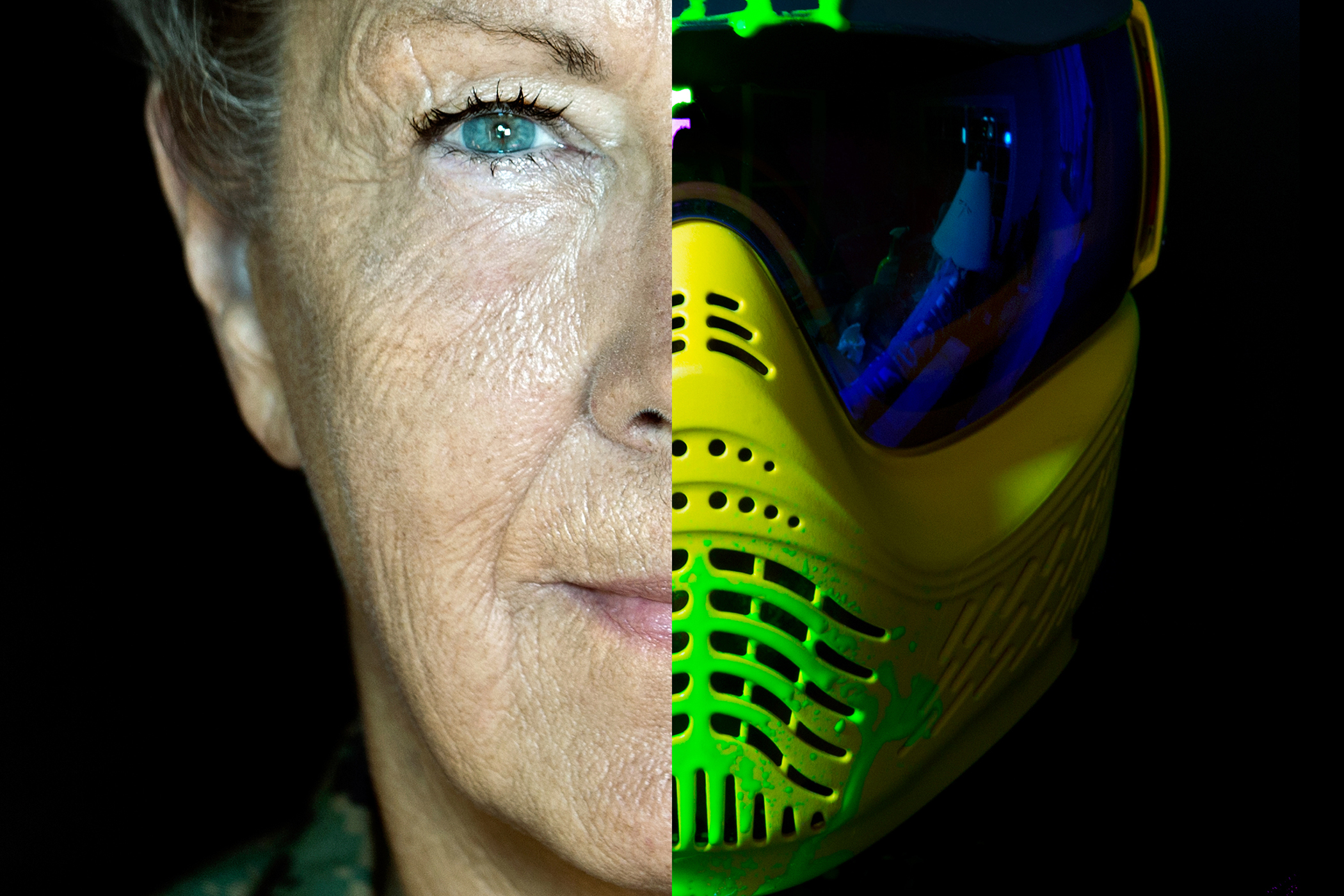
Bambi Bullard
Age: 64
Military status: Medically retired as staff noncommissioned officer
Years served: 15
Location and occupation: Murrells Inlet, South Carolina; semiretired business owner and former business professor
A lot of people didn't even know women existed in the Marines. After I got out of boot camp some woman in an airport asked me if I was in the Girl Scouts.
I volunteered to be an instructor at Parris Island. That was a little bit rough, but I made it through. In two tours, I probably had one or two recruits that I raised my voice to. I didn't need to: I was 6 feet 2 inches tall. I found it more effective to walk up behind them while they were standing at attention and just whisper.
If I had not had that military background, I would have never been as successful in business as I was. The paintball industry was more open and less misogynistic — absolutely less — than what I experienced early in the Marine Corps. I went from a locker box of plastic pistols when I first bought into it to a nationally recognized operation. They just created the Paintball Hall of Fame. I was in the first class, and the first female, so that was pretty cool.
I hope the photos convey that Marines can be hardcore in one respect, but we know how to have fun and we're humans and we enjoy activities just like everybody else does.
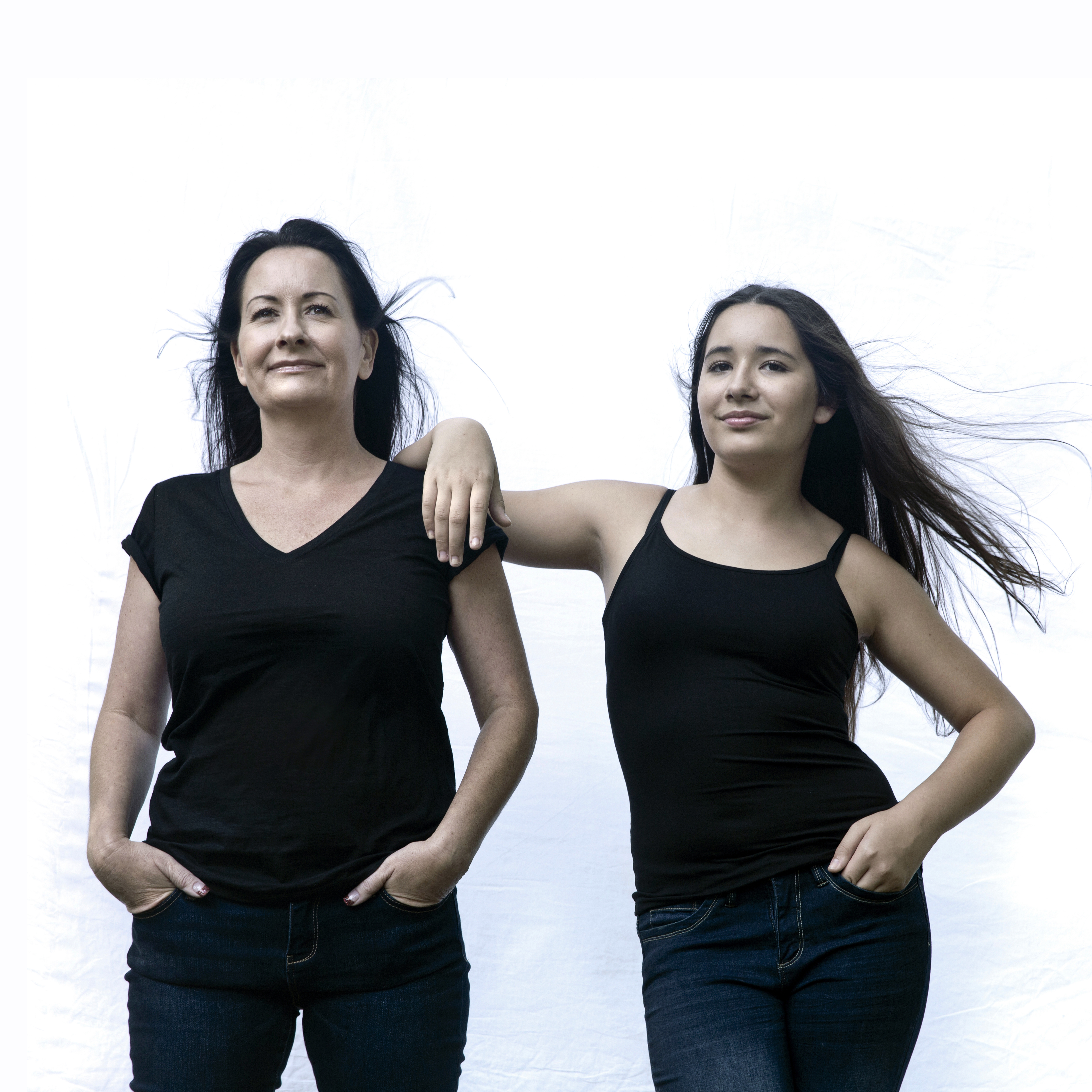
Carrie Ann Lynch
Age: 45
Military status: Retired as gunnery sergeant
Years served: 21
Location and occupation: Fredericksburg, Virginia; college student
I always wanted to be a Marine. My father was a Marine before I was born. I didn't have the white-picket-fence childhood, so I knew I wanted to get out on my own, and the Marine Corps is how I did that. I got to boot camp with my Aqua Net hair spray and my big bangs and my painted toenails and my blue eyeliner, and I was in for a shock. A lot of people didn't think I could do it, and that is what pushed me toward doing it.
The Marine Corps was the best thing that ever happened to me. It wasn't always rainbows and unicorns, but it made me the person that I am today. I'm very thankful for the friends that I made and the experiences that I had.
When I think of myself, I think of a strong mother of a strong, independent child. I hope the photo of us shows that strength. I was a single mother as active duty, and I'm doing it now. I'm a full-time college student and single mother of a middle-schooler. It can be done.
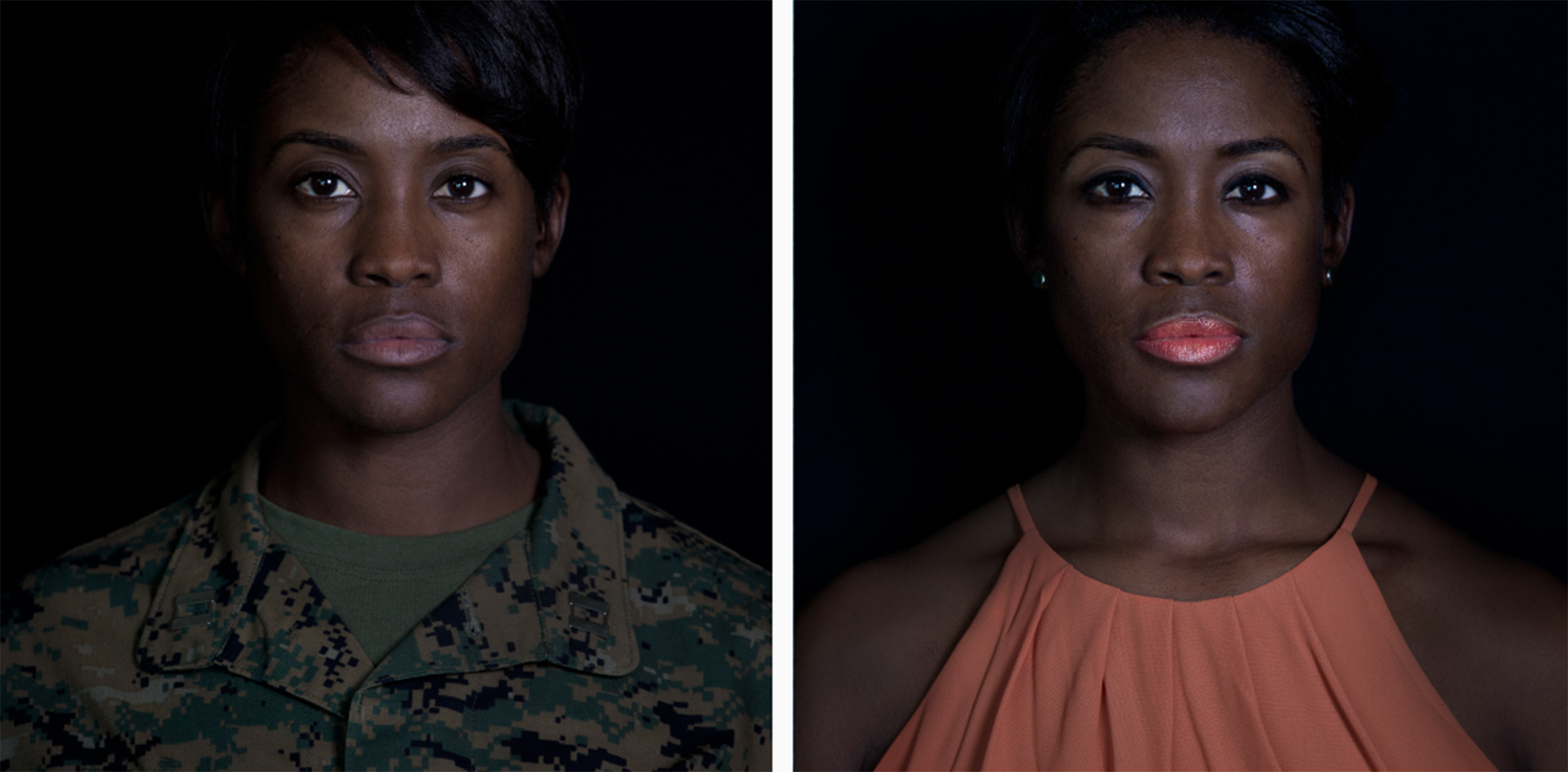
Tracey Fetherson
Age: 29
Military status: Active-duty captain
Years served: 6
Duty station: Quantico
The Marine Corps presented the best challenge for developing a leadership style, and both of my parents retired from the Marines [as sergeants major]. So I always knew I would join the Marine Corps. I knew that no matter what, I was able to succeed, because I have seen examples in my life.
The numbers are significantly slim when you're talking about African-American women officers; the last number I heard was about 108 from 2nd lieutenant to colonel. I feel even more that there will be nothing to stop me because there are so few of us in this position. I want to show other black women, Not only can you join the Marine Corps, you can be successful in the Marine Corps.
As a young professional, I haven't reached that point in my career when I have completely separated my personal and professional life. Being a Marine is very much 24/7; there is a sense of leadership that follows me even when I take the uniform off. So we tried to re-create the same face in uniform and in civilian attire.
I hope people see someone who is a powerful, beautiful leader when they look at me in my uniform. And I hope they see someone who is still powerful, strong yet approachable, still has a zest for life, still willing to live for the good moments when I'm in the dress. The word we kept utilizing throughout the photo shoot was "strong."
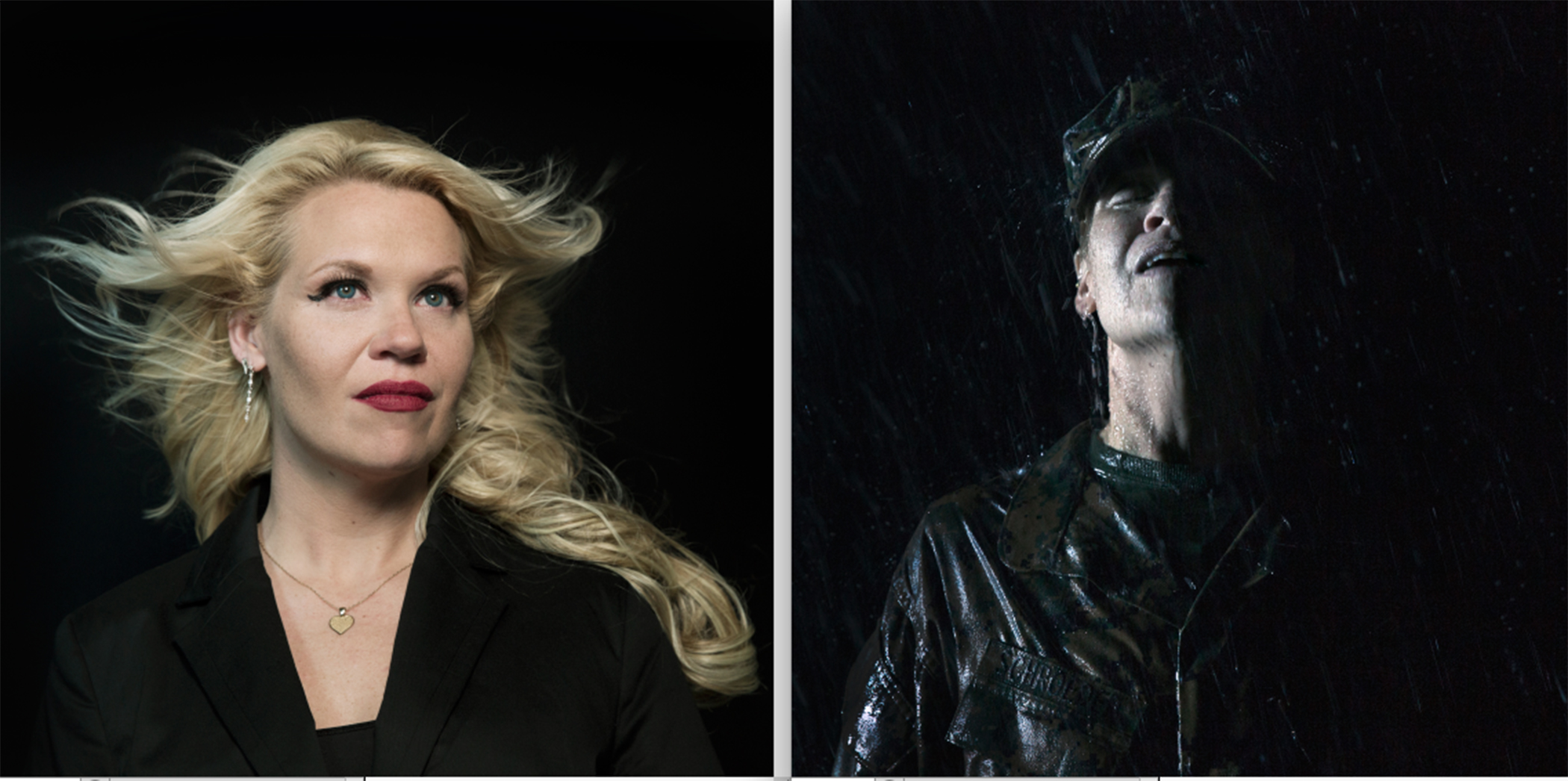
Stephanie Schroeder
Age: 36
Military status: Disabled veteran
Years served: 2 1/2
Location and occupation: Greensboro, North Carolina; advocate for victims of military sexual assault
Even after everything I've been through, I still love the Marine Corps. Who I am today is the direct result of the Marine Corps. It taught me a lot of bearing, it taught me a lot of discipline, it taught me the things that I needed, actually.
The rape was different; things changed then. If I would've been smart, I wouldn't have said anything, and I would've just kept right on going and I probably would still be active today. It was overwhelming. The photo of the drenching is exactly how I felt: When it rains it pours. How much more can I take?
The other photo, that's more me like who I am today — the courage it takes to put that face on and put that business suit on and have that debate one leader at a time. It takes courage to talk about rape with people who don't really think much wrong is going on. I'm not fighting on the ground, but it's a battlefield nonetheless.
My best girlfriend, she looked at me and she said: "How can you go back and be around them?" And I said because change. Change is worth more to me. I know that I am broken. I won't ever be the same again. But I can make the best of what I have. So that's what I do.
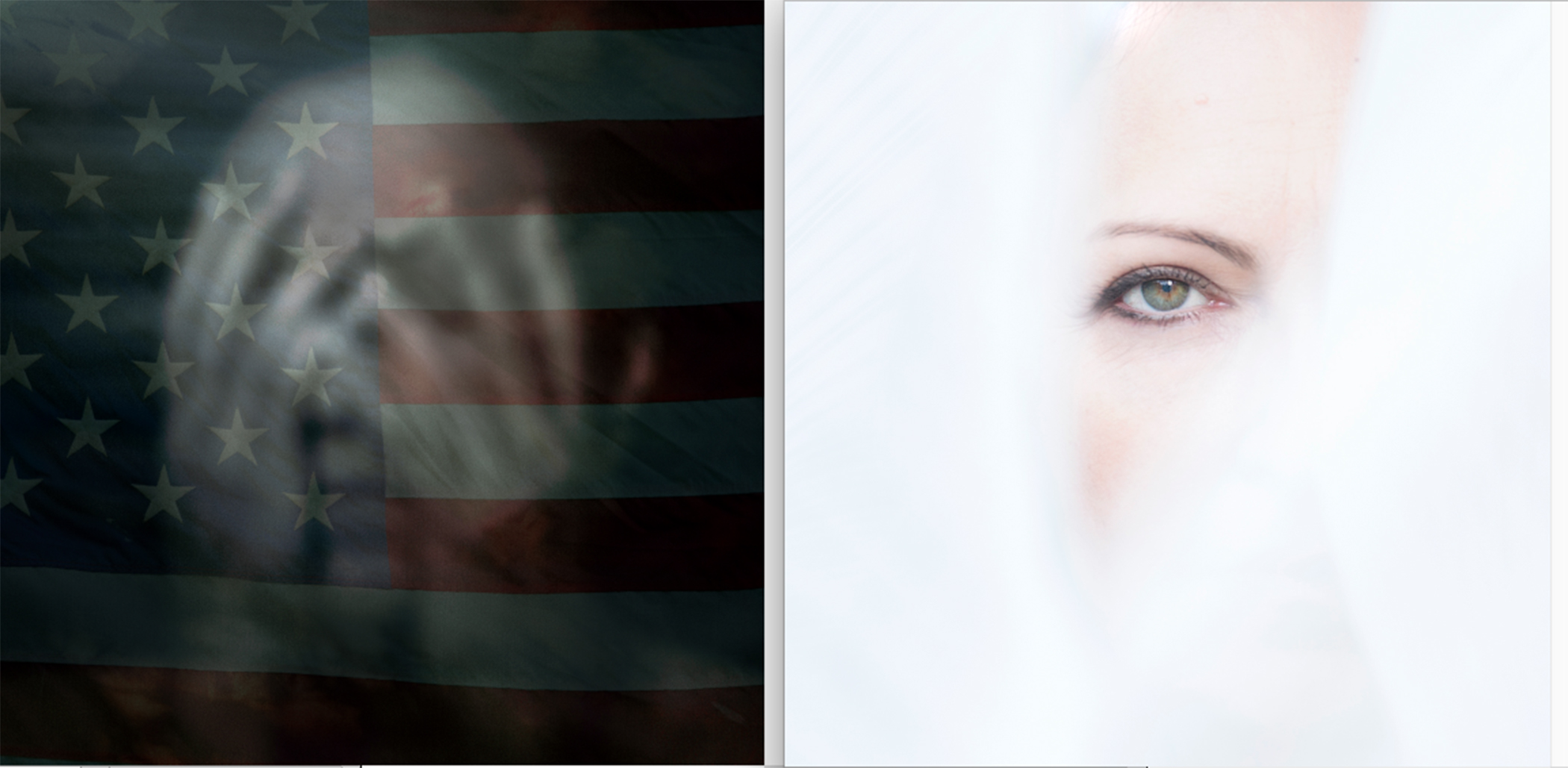
Jackie Huber
Age: 52
Military status: Retired as chief warrant officer 2
Years served: 20
Location and occupation: Fredericksburg, Virginia; photography studio owner
In my eyes and from what I had heard, the most difficult thing a woman could do is to join the Marine Corps. I don't know what made me want to try to do the hardest thing I could think of. It was emotionally taxing, and it was physically taxing, and more emotionally than I think I had bargained for. I built a wall to protect myself and to push people away who might otherwise try to take advantage of me or to see that I was not as strong as maybe I projected.
When I got out, I had to do a lot of research and a lot of reading and a lot of educating myself on how to build a business. And a lot of things it required I didn't want to do: I didn't want to talk to people, I didn't want to be around people, I didn't want to be social, I didn't want to network. The process has been trying to tear that wall down and be more approachable and outgoing and be myself. It's okay to be myself now. It's kind of like an emergence, a rebirth after having been just held down and kind of not encouraged to be yourself.
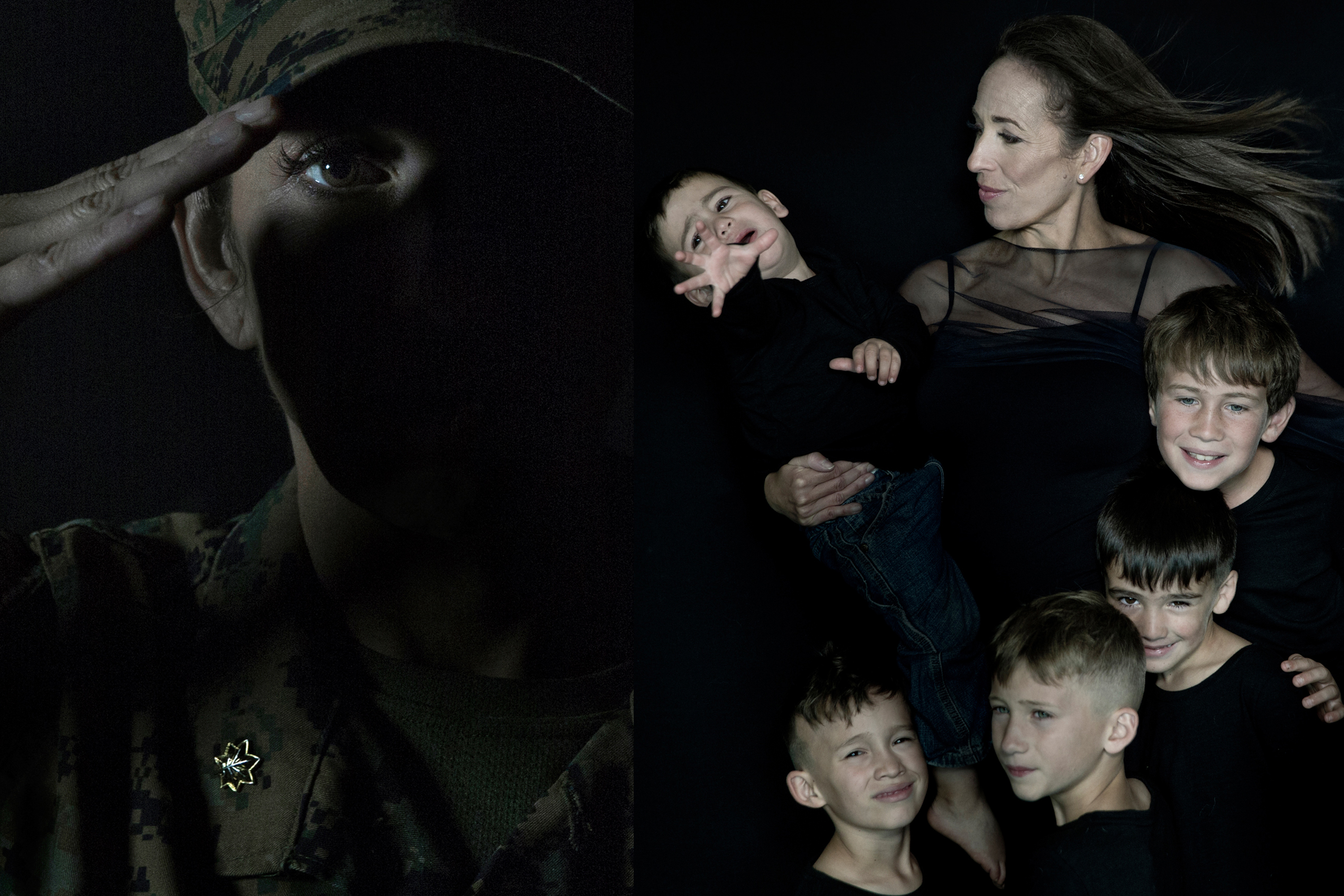
Juliet H. Calvin
Age: 43
Military status: Active-duty major
Years served: 25
Duty station: Camp Pendleton, California
Most women in the Marine Corps don't have large families. It's even more rare for female officers to have large families. But I don't really feel like I have a lot of boundaries. My husband and I have a great partnership. We also have a very organized house, so everything has a specific time and a specific rhythm. When we have different active-duty stations, I generally take the family responsibilities with me. But I don't think that people have looked at me differently. I've had really good leadership that has been supportive, but I also put a lot into my professional life.
I would hope my uniform photo conveys discipline or honor, and I hope my civilian-attire photo can be a juxtaposition of being a woman as well. There are a lot of women out there that don't talk about their life as a mom or a woman because they want to conform. So I think it's a positive example to put out there. I think good leadership takes on a lot of different characteristics.
If I look at it from today as opposed to 25 years ago, I'm very happy with where the Marine Corps is at and where it's going. There are a lot of really positive changes. Some people ask me if I'm going to retire anytime soon, and I tell them, no, I'm still having fun. Still having fun and in great shape and still competitive.
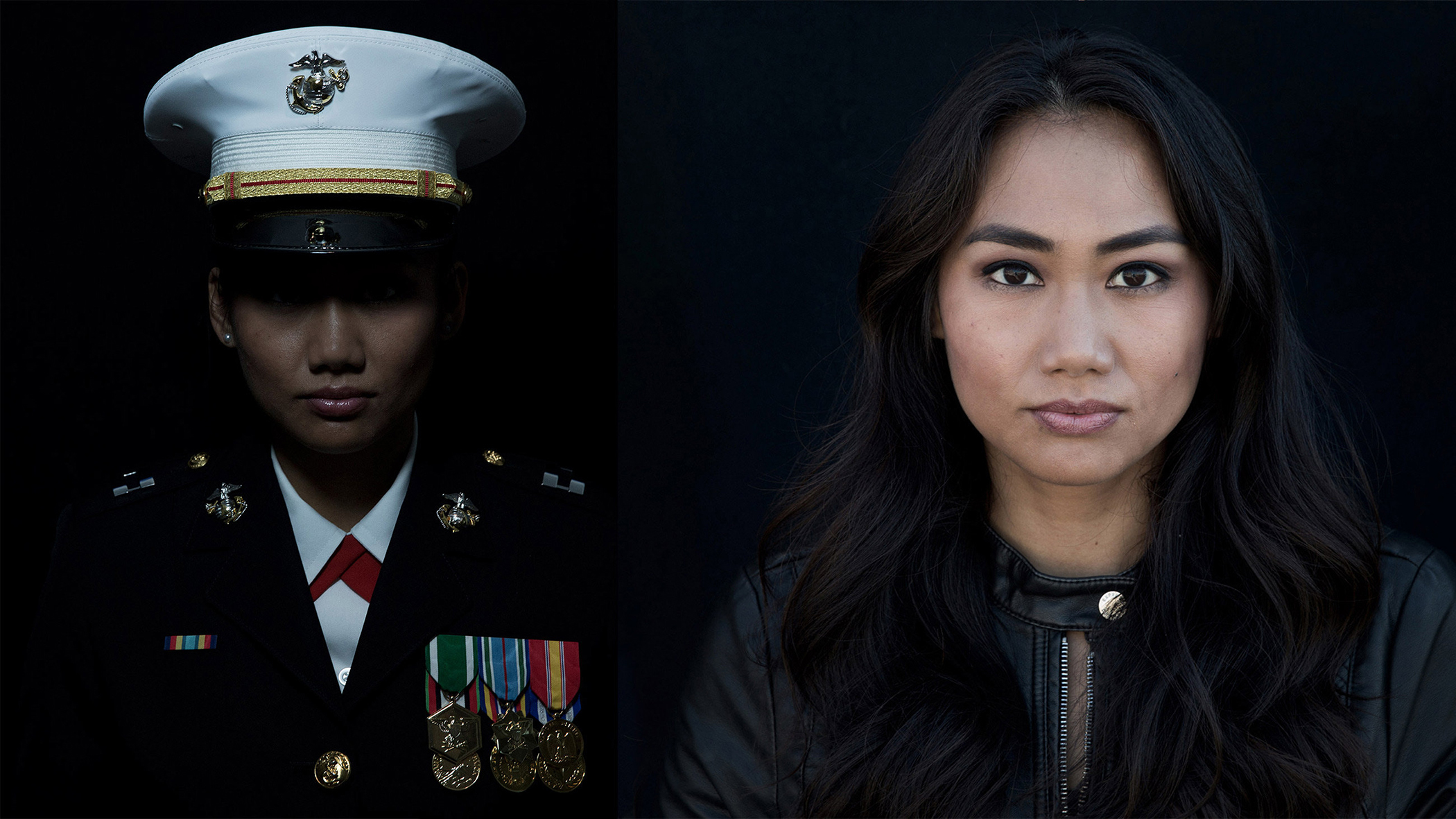
Justine Elena
Age: 32
Military status: Captain, U.S. Marine Corps Reserve
Years served: Active duty, 4; reserve, 5
Location and occupation: New York City; audience supervisor for "The Daily Show With Trevor Noah"
My parents were born and brought up in the Philippines, and my dad joined the U.S. Air Force. My uncles joined all the different services of the U.S. military. I ended up being the only American in my family and the only woman to join a military service and the only U.S. Marine and the only officer. When people met me, even if I was in uniform, they would ask, "Oh, are you really in the Marine Corps?" I don't know if it was because I'm a minority, I'm a woman or I have a very feminine look.
I have so many interests. One of those was, Do I have what it takes to be a Marine? But I'm more than just a Marine. I'm a comedian, I'm a musician, I'm an artist. With the civilian photo being so much about expressing the different sides of me, the uniform photo was kind of like no side: This is what you are, and there isn't a whole lot of room for the rest of your personality. But I am going to express myself in different ways because that's what life is about. Someone out there may be wondering if they have what it takes. If I don't hold to my authenticity, it can be a deterrent to someone else.
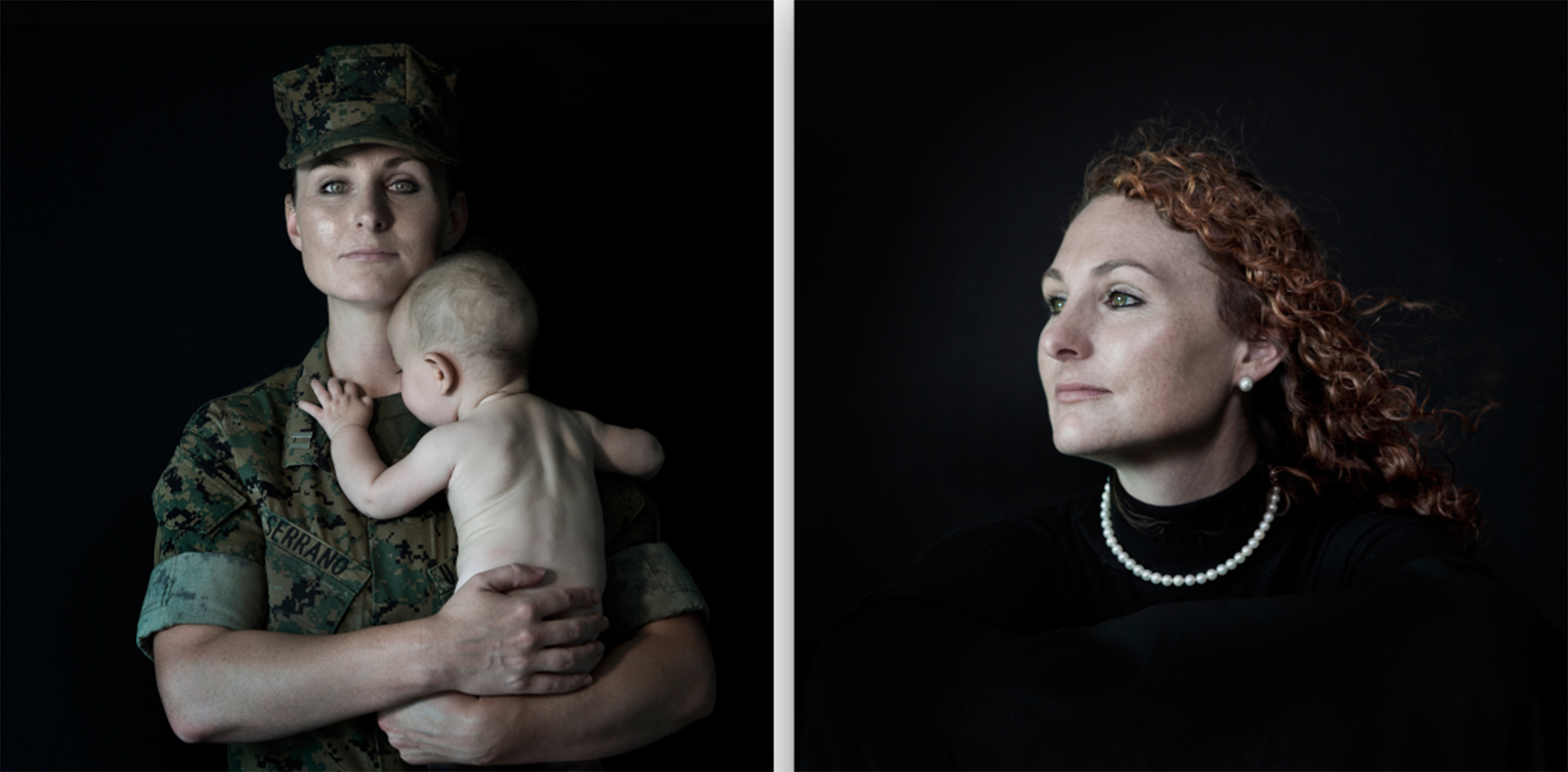
Lauren Finch Serrano
Age: 31
Military status: Active-duty captain
Years served: 8
Duty station: San Diego
When you walk into a Marine Corps recruiters' office they're like, "All right, this is the most bada--. It's going to be the hardest, you're going to get dirty, you're going to cry, you're going to scream, but if you're willing to challenge yourself, you can do this, you can do anything." I'm a sucker for that kind of recruiting.
As an intel officer, my gender was actually an advantage, because they needed women to do certain missions and fulfill certain roles that men were incapable of doing. But when it comes to family, I think the traditional gender roles still are very prevalent in the military. There's still that expectation that I'm taking care of most of the kid stuff and my husband is not.
In the civilian photo, I wore my pearls and some jewelry that I think is very professional, and that's who I want to be outside of uniform. But having my kids in one or both of the photos is important to me because it shows that I do have balance in my life. I can be a bada-- Marine during the day and be here directing things going on in my shop in my uniform, and then I go home and I've got a 2-year-old and a 5-month-old pulling my hair out and my husband is acting silly — and we can kick back and be silly and goofy and fun and happy.